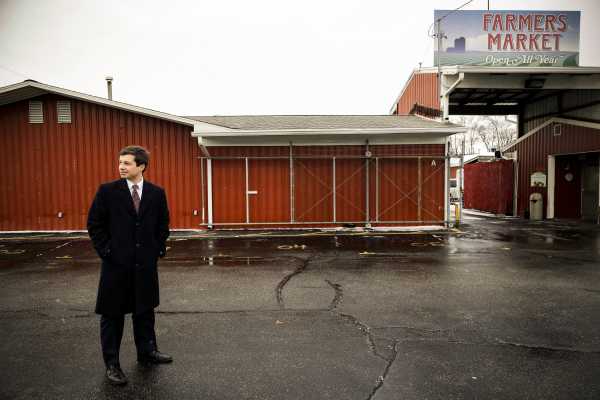
Part of
Vox’s guide to where 2020 Democrats stand on policy
The youngest Democratic contender for president, South Bend, Indiana, Mayor Pete Buttigieg, will be 68 years old in 2050. That’s younger than fellow hopefuls Sen. Bernie Sanders, Sen. Elizabeth Warren, and former Vice President Joe Biden are right now.
So the urgency embedded in his new plan to combat climate change released Wednesday is fitting. “We’re running out of time. Experts tell us that we have 10 years to get on the right path, or global warming will reach catastrophic levels by 2050,” he wrote. “But the timeline that compels us to act isn’t set by Congress — it’s being dictated by science.”
Though his proposal has a more modest government outlay than the plans proffered by some of the other 2020 contenders, Buttigieg sets some aggressive benchmarks: doubling clean electricity in the US by 2025, zero emissions in electricity generation by 2035, net-zero emissions from industrial vehicles by 2040, and a net-zero emissions by 2050 (when he’s 68).
Drawing on his experience as a mayor, Buttigieg’s strategy also includes a special focus on supporting towns and cities like South Bend in the clean energy transition. Every part of the country, he argues, deserves the chance to participate, whether that’s through energy efficiency upgrades, job training for displaced workers, or resiliency against extreme weather. “It means tapping into the potential of rural communities to become part of the solution,” Buttigieg wrote.
The plan also raises a variety of economic tools to accelerate the shift toward a low-carbon future, like climate action bonds, creating a clean energy bank, and ending subsidies for fossil fuels. It also calls for US diplomatic and financial leverage on the global stage to push other countries to move aggressively to curb their emissions.
Though the field of Democratic contenders has begun to narrow, there are still 10 candidates who have qualified for the next official debate. And among those remaining, most have also put out comprehensive visions to address climate change. So while it’s become increasingly difficult to stand apart from the field, failing to put forward a climate change proposal at this point would have been a conspicuous omission.
Buttigieg will get a chance to make his case at CNN climate change town hall event on Wednesday.
Buttigieg’s plan creates new financial tools to fight climate change
The word “trillion” doesn’t appear anywhere in Buttigieg’s plan, but his campaign told Vox it estimates the government will spend $1.5 trillion to $2 trillion for the proposal, in addition to investments in modernizing, roads, railways, water mains, and bridges. That’s relatively modest compared to plans from candidates like former Rep. Beto O’Rourke ($5 trillion) or Vermont Sen. Bernie Sanders ($16.3 trillion).
But for the price, Buttigieg expects the plan to create 3 million new clean energy jobs. He expects that money to motivate non-federal and private funding mechanisms as well.
In addition, he proposes a variety of financial instruments to drive the transition toward cleaner energy, including:
- Carbon price and rebate scheme: Money generated by an economy-wide price on carbon would be distributed back to low- and middle-income Americans.
-
Climate risk
- Equitable disaster relief: This means faster and easier access to federal disaster funds, but also ensuring that the money is protected from political wrangling so that money goes where it’s needed and not to who has better traction in Congress.
- National catastrophic extreme weather insurance: Create a national insurance program to protect from devastation worsened by climate change, but also other disasters like earthquakes.
- Climate-smart agriculture: Develop farming methods that not only reduce greenhouse gas emissions from food production and resist extreme weather, but actually use crops and soil management techniques to encourage absorption of carbon.
- Regional Resilience Hubs: Create centers throughout the country managed by local communities that develop strategies to deal with the specific climate risks in the region, funded in part by $5 billion in annual grants.
The proposal also calls for strengthening worker protections via unions and job retraining with a $200 billion transition fund for workers such as coal miners who would soon find themselves out of work. This may be one of the most critical planks in the plan for building a coalition of support.
While unions are an important constituency for Democrats, some have been skeptical of proposals to radically reshape the energy sector like the Green New Deal. Buttigieg says he supports the Green New Deal, but a major test of his approach to it will be whether he can bring coal, oil, and gas workers on board.
Sourse: vox.com






